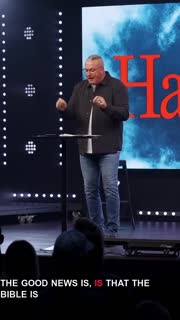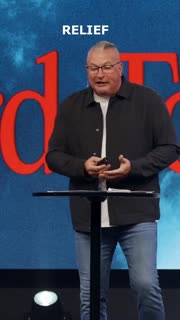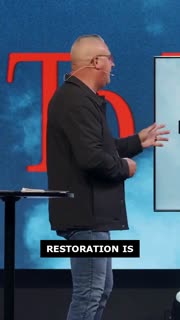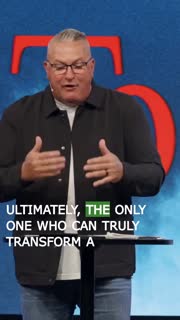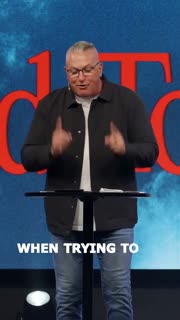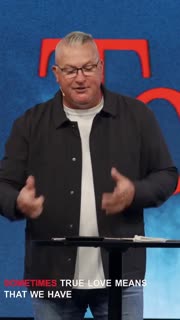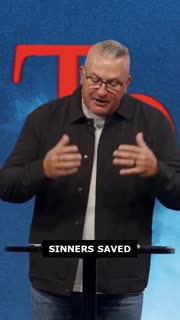Restoration Over Relief: Navigating Difficult Relationships
Devotional
Sermon Summary
Bible Study Guide
Sermon Clips
### Quotes for Outreach
1. "Look, we're called to love everyone. And we're going to talk all about this. And we should. But you and I both know that there are some people in and around our lives that you would rather slam your hand in a car door than go to dinner with. And you know it's true." [08:15] (14 seconds)
2. "The good news is, is that the Bible is full of wisdom on how to handle these sometimes very difficult relationships in our life. And that's what we're going to do for the next four weeks." [09:47] (9 seconds)
3. "Relief is immediate and temporary assistance. Tragic happens. There is an immediate need that's present, and we rally together to alleviate the pain of the moment. And I just want to say, honestly, we all as a society do pretty good at this." [17:00] (14 seconds)
4. "Restoration is an ongoing process to help people grow, to help them mature, and to help them rediscover their God-given potential. We are not nearly, nearly as good at this one. This is not just about doing something for them. It is about working to ensure they mature, that their God-given potential is not just lost and rendered useless." [17:50] (23 seconds)
5. "Ultimately, the only one who can truly transform a life is God, and we must work to do everything we can to connect these needy people to him, to get them to see and understand him, depend on him, lean on him. And run to him." [23:30] (15 seconds)
### Quotes for Members
1. "It is vital that we all acknowledge that at one time or another, that we ourselves have actually been the ones that are hard to love. We are. Everybody in this room, I know that your sweet grandmother told you that you were special. I know she did. I know that there was no, she told you there was no one like you, that you did everything so well, that you were so well-rounded and you were so well-grounded and that everybody liked you. I'm going to go ahead and tell you something that I've learned about grandmothers. They're liars." [11:38] (31 seconds)
2. "When trying to help the needy people in our lives, this is so true now, you need to realize that they are always going to tell you what they think they need. They're going to tell you what they think they need. This is when you pray for wisdom and discernment in order to not just immediately give them what they want, but what you feel the Holy Spirit is leading you to truly discern what they need." [24:30] (26 seconds)
3. "Sometimes true love means that we have to let them experience the consequences because it will serve them well. I had a great dad and have a great dad, but I had an old school dad. Now there's a lot of ways I could describe to you how old school my dad is, but I'll give you one." [33:35] (26 seconds)
4. "Real love doesn't always come to the rescue. Sometimes real love allows for the results so that meaningful change can take place in people's lives. It just is." [36:27] (10 seconds)
5. "We are all sinners saved by the amazing grace of God through his son, Jesus Christ, and we are all in need of him. And while we cannot fix everybody again and everything ourselves, we do have the ability as agents of recognition. And connect them to Christ. And he can do, according to Ephesians 3 and 20, exceedingly, abundantly, above all that we could ever ask or imagine." [39:21] (30 seconds)
Ask a question about this sermon
1. "Look, we're called to love everyone. And we're going to talk all about this. And we should. But you and I both know that there are some people in and around our lives that you would rather slam your hand in a car door than go to dinner with. And you know it's true." [08:15] (14 seconds)
2. "The good news is, is that the Bible is full of wisdom on how to handle these sometimes very difficult relationships in our life. And that's what we're going to do for the next four weeks." [09:47] (9 seconds)
3. "Relief is immediate and temporary assistance. Tragic happens. There is an immediate need that's present, and we rally together to alleviate the pain of the moment. And I just want to say, honestly, we all as a society do pretty good at this." [17:00] (14 seconds)
4. "Restoration is an ongoing process to help people grow, to help them mature, and to help them rediscover their God-given potential. We are not nearly, nearly as good at this one. This is not just about doing something for them. It is about working to ensure they mature, that their God-given potential is not just lost and rendered useless." [17:50] (23 seconds)
5. "Ultimately, the only one who can truly transform a life is God, and we must work to do everything we can to connect these needy people to him, to get them to see and understand him, depend on him, lean on him. And run to him." [23:30] (15 seconds)
### Quotes for Members
1. "It is vital that we all acknowledge that at one time or another, that we ourselves have actually been the ones that are hard to love. We are. Everybody in this room, I know that your sweet grandmother told you that you were special. I know she did. I know that there was no, she told you there was no one like you, that you did everything so well, that you were so well-rounded and you were so well-grounded and that everybody liked you. I'm going to go ahead and tell you something that I've learned about grandmothers. They're liars." [11:38] (31 seconds)
2. "When trying to help the needy people in our lives, this is so true now, you need to realize that they are always going to tell you what they think they need. They're going to tell you what they think they need. This is when you pray for wisdom and discernment in order to not just immediately give them what they want, but what you feel the Holy Spirit is leading you to truly discern what they need." [24:30] (26 seconds)
3. "Sometimes true love means that we have to let them experience the consequences because it will serve them well. I had a great dad and have a great dad, but I had an old school dad. Now there's a lot of ways I could describe to you how old school my dad is, but I'll give you one." [33:35] (26 seconds)
4. "Real love doesn't always come to the rescue. Sometimes real love allows for the results so that meaningful change can take place in people's lives. It just is." [36:27] (10 seconds)
5. "We are all sinners saved by the amazing grace of God through his son, Jesus Christ, and we are all in need of him. And while we cannot fix everybody again and everything ourselves, we do have the ability as agents of recognition. And connect them to Christ. And he can do, according to Ephesians 3 and 20, exceedingly, abundantly, above all that we could ever ask or imagine." [39:21] (30 seconds)

